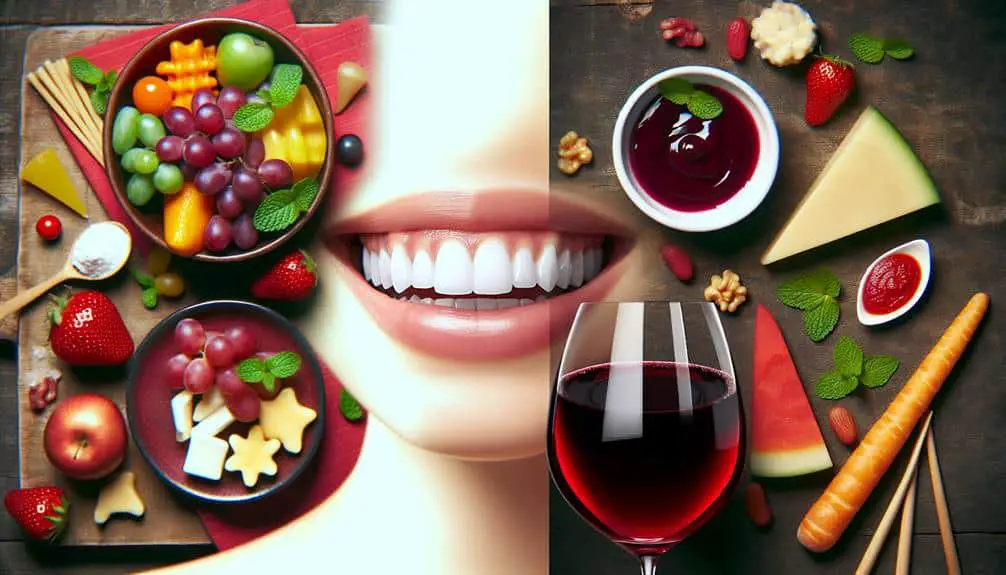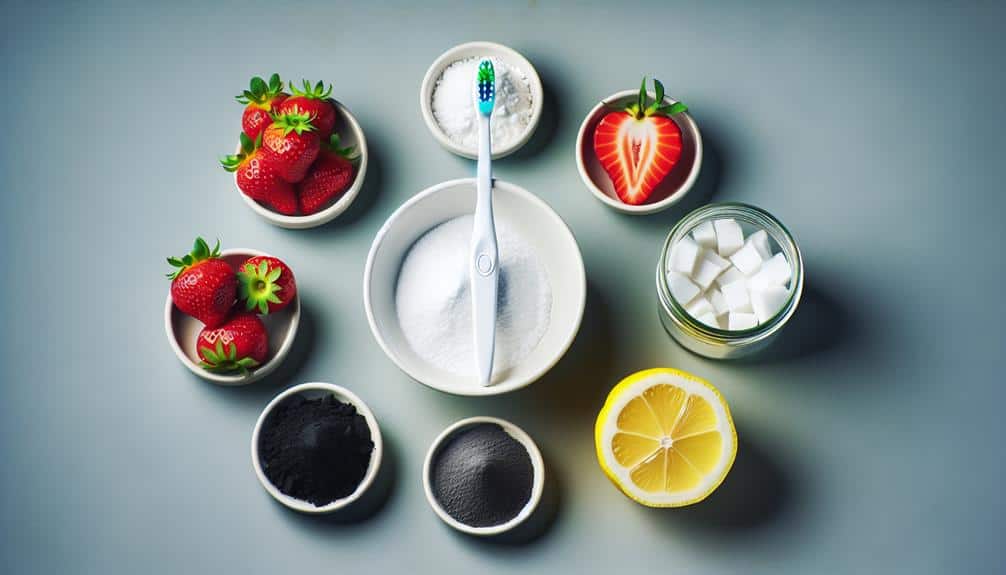For the most effective solution to combat wine and food stains on your teeth, professional whitening procedures stand out as the best choice, providing a thorough remedy for stubborn discoloration caused by frequent consumption of staining agents. Consider consulting your dentist for tailored advice on maintaining a bright smile that resists staining from your favorite foods and beverages.
Key Points
- Consider professional whitening procedures like laser treatments for effective removal of tough wine and food stains.
- Consult a dentist for personalized advice on the best whitening method suited for wine and food stains.
- Use at-home whitening kits with bleaching trays for consistent application to tackle wine and food stains.
- Maintain oral hygiene with a balanced diet to prevent new wine and food stains after whitening procedures.
- Opt for in-office laser whitening or at-home bleaching trays for thorough removal of stains from wine and food consumption.
Types of Teeth Whitening Treatments
When considering teeth whitening treatments for wine and food stains, various options are available to help you achieve a brighter smile. Natural alternatives offer a gentler approach to teeth whitening, utilizing ingredients like baking soda, activated charcoal, or hydrogen peroxide to remove surface stains effectively. DIY methods can be cost-effective and convenient, but using them cautiously is vital to prevent damage to your enamel or gums.
Natural alternatives such as baking soda can act as a mild abrasive to scrub away stains on the tooth surface gently. Activated charcoal is another popular option known for its adsorptive properties, which can bind to particles, including those causing stains on teeth. Hydrogen peroxide, when diluted correctly, can also help whiten teeth by breaking down stains.
DIY methods like oil pulling with coconut oil or using fruit peels like banana or orange may offer some benefits in removing surface stains. However, approaching these methods with care and not relying on them as a sole whitening solution, especially for stubborn stains, is important.
Factors to Consider Before Whitening
Before proceeding with teeth whitening for wine and food stains, it's pivotal to contemplate several key factors to guarantee effective and safe treatment.
- Diet changes: Consider adjusting your diet to include less staining foods and beverages. Avoiding items like red wine, coffee, and dark berries can help maintain your newly whitened smile.
- Lifestyle habits: Evaluate habits such as smoking or excessive consumption of staining substances. Making changes to these habits can't only improve the longevity of your whitening results but also benefit your overall oral health.
- Consultation with a dentist: Prior to whitening, it's advisable to consult with a dentist. They can assess your oral health, recommend the most suitable whitening method, and address any underlying dental issues that may affect the whitening process.
- Sensitivity concerns: If you have a history of tooth sensitivity, discuss this with your dentist before whitening. They can provide options to minimize discomfort during and after the treatment.
Tips for Maintaining Whitened Teeth
To maintain your newly whitened teeth effectively, it's important to establish a consistent oral care routine tailored to prolong the brightness of your smile. After undergoing a teeth whitening treatment, preventive measures are essential in maintaining the results. Post-treatment care involves avoiding foods and beverages that are known to stain teeth, such as red wine and coffee. Long-term maintenance of whitened teeth requires dedication to good oral hygiene practices. Brushing your teeth at least twice a day with a fluoride toothpaste and flossing daily can help prevent new stains from forming.
In addition to oral care, dietary habits play a significant role in maintaining the whiteness of your teeth. Consuming foods that are high in sugar and acids can contribute to teeth discoloration. Opt for a balanced diet rich in fruits, vegetables, and lean proteins to support overall oral health. Remember to attend regular dental check-ups to address any concerns promptly and make sure your whitened teeth stay bright for the long term.
Home Remedies for Stain Removal
For effective stain removal at home, consider utilizing natural remedies recommended by dental professionals. These DIY tricks can help you combat the discoloration caused by wine and food stains:
- Baking Soda and Hydrogen Peroxide: Create a paste by mixing baking soda with hydrogen peroxide, then brush your teeth with this mixture to help remove stubborn stains.
- Apple Cider Vinegar: Gargle with a diluted solution of apple cider vinegar to help break down stains on the surface of your teeth.
- Strawberries and Baking Soda: Mash strawberries with baking soda to form a paste. Apply this mixture to your teeth for a few minutes before rinsing to reduce stains.
- Oil Pulling with Coconut Oil: Swish coconut oil around in your mouth for about 15 minutes daily. This method may help eliminate bacteria and reduce surface stains on your teeth.
These natural solutions provide a gentle way to address discoloration without harsh chemicals. Remember, consistency is key when using these home remedies for stain removal.
Professional Whitening Procedures
Exploring beyond home remedies, professional whitening procedures offer a thorough solution to tackle stubborn stains caused by wine and food consumption. When it comes to professional whitening, there are two primary options: in-office treatments and at-home kits using bleaching trays.
In-office procedures often involve laser whitening, which is a popular choice due to its efficiency and immediate results. During a laser whitening session, a bleaching agent is applied to your teeth, and then a laser is used to activate the whitening process, breaking down stains and discoloration effectively.
For those who prefer the convenience of whitening their teeth at home, bleaching trays provided by dental professionals can be an excellent option. These custom-fit trays ensure consistent application of the whitening gel, leading to reliable results over time.
Both in-office laser whitening and at-home bleaching tray options have been proven effective in removing tough stains from wine and food, providing a reliable solution for those seeking professional-grade whitening treatments.
Frequently Asked Questions
Can Teeth Whitening Treatments Affect the Sensitivity of My Teeth?
Feeling the twinge? Tooth sensitivity can be caused by various factors, including enamel erosion and gum recession. Contrary to myths, teeth whitening doesn't always trigger sensitivity; proper techniques and products can minimize any discomfort.
How Long Do the Results of Teeth Whitening Treatments Typically Last?
To maintain teeth whitening results, focus on oral hygiene and lifestyle habits. Regular maintenance can help prolong the effects. Typically, results can last from several months to a year, depending on your care routine.
Are There Any Specific Foods or Drinks That Should Be Avoided After Whitening to Prevent Staining?
After whitening, opt for tooth-friendly snacks like crisp apples or raw veggies. Avoid wine pairings or staining culprits. Keep that radiant smile by making wise choices post-treatment. Your commitment to oral health matters.
Is It Safe to Use Teeth Whitening Products During Pregnancy or While Breastfeeding?
During pregnancy or breastfeeding, consult your dentist for dental checkups and professional advice on using teeth whitening products. Precautions are crucial, and they may recommend alternatives to guarantee safety for you and your baby.
Are There Any Potential Side Effects of Professional Teeth Whitening Procedures That I Should Be Aware Of?
When considering professional teeth whitening, be aware of potential risks like tooth sensitivity and gum irritation. Long-term effects are minimal if done correctly. Costs vary, but DIY options exist. Consult your dentist for guidance.



